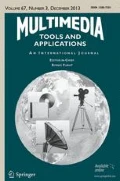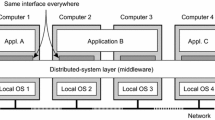Abstract
Discrete service disciplines have been shown capable of emulating the ideal Generalized Processor Sharing (GPS) discipline within one maximum-sized packet's transmission time. As a result, the accuracy of such schemes increases with improvements in link speed due to the corresponding reduction in packet transmission delay. However, the merits of such accuracy diminish with improvements in link speed as the impact on call admission decisions decreases. Meanwhile, overhead, in terms of the number of scheduling decisions to be made per unit time, increases with the number of packets transmitted. In response, this paper will present the QoS-Aware Fair Queuing (QFQ) service discipline which enables emulation servers to dynamically “tune” their service quanta based upon the QoS requirements of their currently supported applications rather than the network's maximum packet size. The paper will also demonstrate how the overhead of a GPS emulation server can be reduced in high speed networks without jeopardizing QoS guarantees or adversely impacting fairness.
Similar content being viewed by others
References
J. Bennett and H. Zhang, “WF2Q:Worst-case fair weighted fair queuing, ” in Proceedings of INFOCOM '96, 1996.
J. Bennett and H. Zhang, “Why WFQ is not good enough for integrated services networks?” in Proceedings of NOSSDAV '96, 1996.
M. Boykin, “A network framework for QoS-aware traffic scheduling and management in integrated services networks, ” Ph.D. Thesis, Department of Computer Science, University of Pittsburgh, 1999, http://www.cs.pitt.edu/boykin1.
D.C. Clark, S. Shenker, and L. Zhang, “Supporting real-time applications in an integrated services packet network: Architecture and mechanism, ” in SIGCOMM '92, 1992, pp. 14-26.
R.L. Cruz, “Service burstiness and dynamic burstiness measures: A framework, ” Journal of High Speed Networks, Vol. 2, pp. 105-127, 1992.
N. Duffield, T. Lakshman, and D. Stiliadis, “On adaptive bandwidth sharing with rate guarantees, ” in Proceedings of Infocom, 1998.
S.J. Golestani, “A self-clocked fair queueing scheme for broadband applications, ” in Proc. IEEE INFOCOM, 1994, pp. 636-646.
P. Goyal and H. Vin, “Generalized guaranteed rate scheduling algorithms: A framework, ” IEEE/ACM Transactions on Networking, Vol. 5, No. 4, pp. 561-571, 1997.
P. Goyal and H.M. Vin, “Fair airport scheduling algorithms, ” in Proceedings of NOSSDAV '97, St. Louis, Missouri, 1997.
W.I. Grosky, R. Jain, and R.M. (Eds.), The Handbook of Multimedia Information Management, Prentice-Hall, 1997.
S. Lam and G. Xie, “Burst scheduling networks: Flow specification and performance guarantees, ” in Proceedings of NOSSDAV '95, Durham, New Hampshire, 1995.
C. McCann, R.Vaswani, and J. Zahorjan, “Adynamic processor allocation policy for multiprogrammed shared memory multiprocessors, ” ACM Transactions on Computer Systems, pp. 146-178, 1993.
C. Nicolaou, “An architecture for real-time multimedia communication systems, ” IEEE Journal on Selected Areas in Communications, Vol. 8, No. 3, pp. 391-400, 1990.
A. Parekh, “A generalized processor sharing approach to flow control in integrated services networks, ” Ph.D. Thesis, Laboratory for Information and Decision Systems, Massachusetts Institute of Technology, 1992.
A.K. Parekh and R.G. Gallager, “A generalized processor sharing approach to flow control in integrated services networks: The single node case, ” IEEE/ACM Trans. on Networking, Vol. 1, No. 3, pp. 344-357, 1993.
A.K. Parekh and R.G. Gallager, “A generalized processor sharing approach to flow control in integrated services networks: The multiple node case, ” IEEE/ACM Trans. on Networking, Vol. 2, No. 2, pp. 137-150, 1994.
H. Sariowan, R. Cruz, and G. Polyzos, “SCED: A generalized scheduling policy for guaranteeing quality-ofservice, ” IEEE/ACM Transactions on Networking, Vol. 7, No. 5, 1999.
W. Stallings, Local and Metropolitan Area Networks, 4th edn., Macmillan: New York, 1993.
R. Steinmetz and K. Nahrstedt, Mulitmedia: Computing, Communication and Applications, Prentice Hall: Upper Saddle River, NJ, 1995.
S. Suri, G. Varghese, and G. Chandranmenon, “Leap forward virtual clock: A new fair queueing scheme with guaranteed delays and throughput fairness, ” Technical Report WUCS-96-10, Washington University in St. Louis, 1996.
A. Varma and D. Stiliadis, “Design and analysis of frame-based fair queueing: A new traffic scheduling algorithm for packet switched networks, ” in Proc. ACM SIGMETRICS, 1996.
G.G. Xie and S.S. Lam, “An efficient adaptive search algorithm for scheduling real-time traffic, ” in Proceeding of ICNP '96, Columbus, Ohio, 1996.
D.Yates, J.Kurose, D. Towsley, and M.G. Hluchyj, “On per-session end-to-end delay distributions and the call admission problem for real-time applications with QoS requirements, ” in Proceedings of ACM SIGCOMM, 1993, pp. 2-12.
Author information
Authors and Affiliations
Rights and permissions
About this article
Cite this article
Boykin, M.S., Znati, T.F. QoS-Aware Fair Queuing: A Low Overhead Packet Scheduling Discipline for Networked Multimedia Environments. Multimedia Tools and Applications 18, 55–83 (2002). https://doi.org/10.1023/A:1015817800471
Issue Date:
DOI: https://doi.org/10.1023/A:1015817800471




